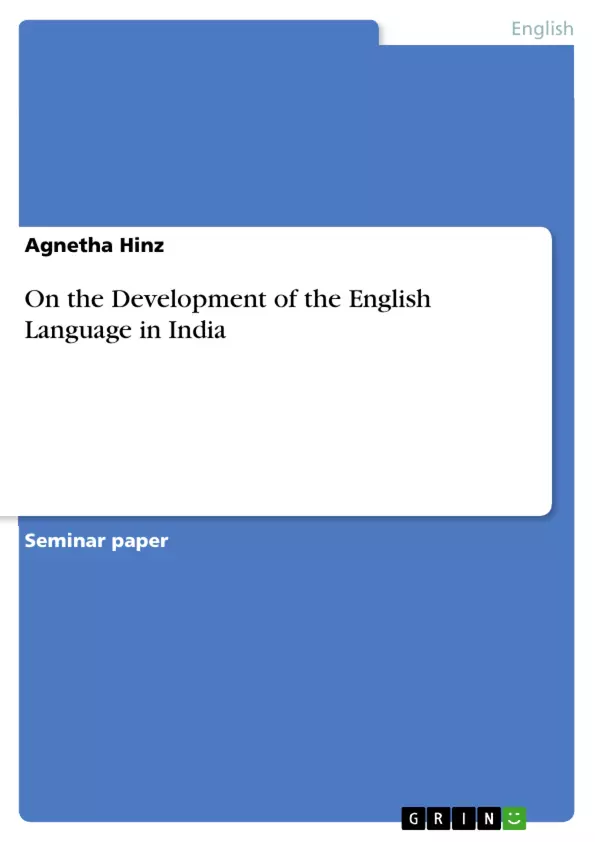“Indian English” is an umbrella term which is used to describe all dialects of the English language that are spoken in the Republic of India. But “Indian English” is not a native language.
Like other variations of the English language, “Indian English” is the result of language contact, which contributed to the development of the present-day “Indian English” due to the mixture of the linguistic aspects and different social backgrounds.
To describe how the development of this language variation occurred, section 2 dwells on the history of “Indian English” and the usage and cultural aspects by expanding on its functions. Its grammatical form is particularly illustrated in section 3, which deals with the most important linguistic features of phonology, morphology, syntax and semantics. The issues contributing the development of “Indian English” are revisited in the conclusion.
Table of Contents
- 1. Introduction
- 2. Development of "Indian English"
- History
- Usage and cultural aspects
- 3. Linguistic aspects and their development
- Phonology
- Morphology
- Syntax
- Semantics
- 4. Conclusion
- 5. Bibliography
Objectives and Key Themes
This seminar paper aims to explore the development of Indian English, examining its historical roots, cultural significance, and key linguistic features. The paper investigates how language contact between English and Indian mother tongues shaped the evolution of this variety.
- The historical development of Indian English, tracing its origins from the British colonization of India.
- The diverse usage and cultural impact of Indian English in various sectors of Indian society.
- The key phonological features differentiating Indian English from Received Pronunciation (RP).
- The evolution of morphology, syntax, and semantics within Indian English.
- The role of language contact and interference in shaping the linguistic features of Indian English.
Chapter Summaries
1. Introduction: This chapter introduces the concept of "Indian English" as an umbrella term encompassing various English dialects spoken in India. It emphasizes that Indian English is not a native language but a product of language contact between English and Indian mother tongues, highlighting the influence of both linguistic and sociocultural factors on its development. The introduction outlines the paper's structure, previewing the historical context, cultural impact, and linguistic features that will be discussed in subsequent chapters.
2. Development of "Indian English": This chapter explores the historical trajectory and cultural impact of Indian English. The "History" section traces the language's origins back to the early 16th century with the establishment of British trading posts in India, emphasizing the role of British colonization and the founding of Christian schools in disseminating English. The "Usage and cultural aspects" section details the significant role of English in Indian education, administration, law, media, science, and technology, and its presence in Indian culture through media, film, and theatre. The chapter underscores the significant number of English speakers in India, making it a major center for English globally.
3. Linguistic aspects and their development: This chapter delves into the specific linguistic features of Indian English, focusing on phonology. It highlights key differences between Indian English pronunciation and Received Pronunciation (RP). Examples discussed include the variation in aspiration of sounds like /p/, /t/, and /k/, the use of dental plosives in place of fricatives /θ/ and /ð/, and the use of long vowels /e:/ and /o:/ where RP uses diphthongs. While the chapter mentions morphology, syntax, and semantics, the preview only details the phonological distinctions extensively.
Keywords
Indian English, language contact, language variation, Received Pronunciation (RP), phonology, morphology, syntax, semantics, British colonization, cultural impact, education, mass media, sociolinguistics.
Frequently Asked Questions: A Comprehensive Preview of Indian English
What is the overall focus of this academic paper preview?
This preview provides a comprehensive overview of an academic paper on Indian English. It includes the table of contents, objectives and key themes, chapter summaries, and keywords. The paper aims to explore the development of Indian English, examining its historical roots, cultural significance, and key linguistic features.
What topics are covered in the Table of Contents?
The table of contents includes an introduction, a chapter on the development of Indian English (including history and usage/cultural aspects), a chapter on linguistic aspects and their development (phonology, morphology, syntax, and semantics), a conclusion, and a bibliography.
What are the main objectives and key themes of the paper?
The paper aims to investigate the historical development of Indian English, tracing its origins from British colonization. It explores the diverse usage and cultural impact of Indian English across various sectors of Indian society. Key linguistic features, particularly phonological differences between Indian English and Received Pronunciation (RP), are examined. The paper also analyzes the evolution of morphology, syntax, and semantics within Indian English and the role of language contact and interference in shaping its linguistic features.
What are the key takeaways from each chapter?
Chapter 1 (Introduction): Introduces Indian English as a product of language contact, highlighting the influence of linguistic and sociocultural factors. Chapter 2 (Development of "Indian English"): Traces the historical origins from British colonization and details the significant role of English in Indian society and culture. Chapter 3 (Linguistic aspects and their development): Focuses on phonological differences between Indian English and RP, providing examples of variations in aspiration, dental plosives, and vowel usage. While morphology, syntax, and semantics are mentioned, the preview primarily focuses on phonology.
What keywords are associated with this paper?
The keywords include: Indian English, language contact, language variation, Received Pronunciation (RP), phonology, morphology, syntax, semantics, British colonization, cultural impact, education, mass media, and sociolinguistics.
What is the target audience of this preview?
This preview is intended for academic use, allowing for the analysis of themes in a structured and professional manner.
- Arbeit zitieren
- Agnetha Hinz (Autor:in), 2012, On the Development of the English Language in India, München, GRIN Verlag, https://www.grin.com/document/302890



